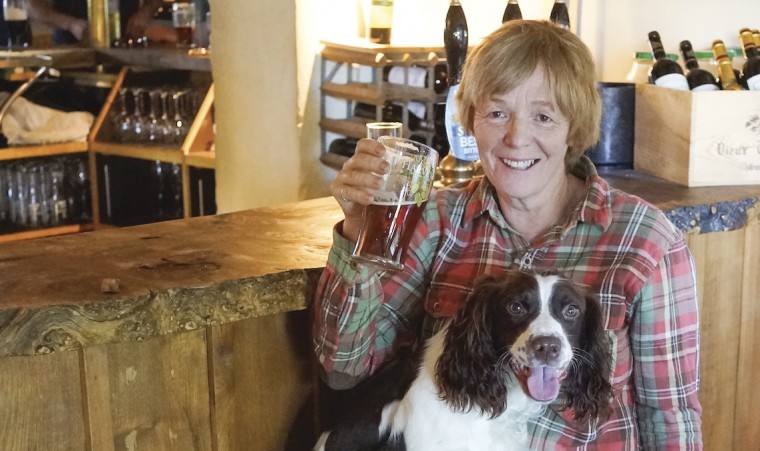The mud has now turned to concrete. We’ve changed from moaning about too much rain to a desperate plea for an April shower. Rain was forecast, so my other half rushed out and spread a little fertiliser to ‘wake up’ the grass. He promised me this would provide adequate growth to enable the ewes to make plenty of milk for their lambs, but not enough to give them magnesium deficiency! But the rain didn’t materialise.
Our new hedging plants also need water. It’s ironic that our tree planting and fencing project had been delayed due to wet ground conditions. It wasn’t until the end of March that we managed to plant out 2,300 native whips, comprising hazel, alder, hawthorn, hornbeam, beech, willow, field maple and holly plants.
We secured some funding from the ‘National Grid visual impact provision – landscape enhancement initiative’ since the Dungeness to Bolney line of pylons crosses our farm. These were built in 1965. I remember seeing a workman, perched up high on the pylon, take off his jacket and throw it down. Initially I thought he was falling and was petrified. While some might say pylons are unsightly, over time you get used to them. We all use electricity.
Ripping out hedges to make field sizes larger was, not so long ago, called ‘progress’. Times change. I like the idea of planting hedges, but when I signed up to do so, I hadn’t fully understood the amount of work involved! Luckily our household numbers have swelled as family members returned home before lockdown. We’ve made best use of this influx. It’s been fun, with everyone joining in, including the grandchildren and dogs, although their ‘help’ tends to be less constructive, more destructive.
Our resident horticulturist, Hannah, took charge, ordering plants, directing operations, measuring and setting up. We planted the whips in a staggered double row 40cm apart with a minimum of six plants per metre. We had two spade diggers, with the rest of us deployed watering, planting, putting in canes and applying the biodegradable rabbit guards. The dogs enjoyed digging holes, while George (20 months old) did quality control, mostly removing guards or strutting around with canes.
Adam Winter Contracting did a great job putting up some sturdy fences to protect our handiwork. I was particularly impressed by the staple gun they used; it’s so efficient. But maybe that’s because when I’m stapling, I’m lucky if one hit in three connects with its target, and then there’s the time wasted looking for errant staples that are playing hide and seek in the grass. I’m so glad we called in the professionals; money well spent. This year there will be no worrying about escaping sheep.
Alarmingly, the ground around one hedge developed dry cracks and we realised that nature wasn’t going to co operate, so we needed a watering strategy. Now that operational grandfather rights for spraying no longer apply, we have a redundant sprayer. This can quickly be filled and dispenses water at a fast rate, requiring one tractor driver and one person to direct a wide bore pipe towards the plant roots. To help retain this moisture, we applied up to 1000-plus “bums’ worth” of sheep daggings on the ground around the plants, to help give them extra protection and provide some natural nitrogen. They are now flourishing.
Other half, myself and the spaniels have moved into our annexe, while the rest of the family has taken over the farmhouse. The Londonites, who are moving, arrived looking pale, accompanied by children with streaming colds. Country living has visibly improved their health. While we were busy worming cattle, I was amused when my son-in-law, James, got shouted at for being in the wrong place at the wrong time! We should probably cut him some slack, considering that his normal day job was in Kensington and Chelsea council offices.
I asked James how he was enjoying life on the farm. His reply was surprisingly positive. He said he liked learning new skills and tractor driving, and that it was good to have a purpose during lockdown. It improves physical fitness; he’s done a lot of digging (breaking two spades) and faced new challenges like catching wayward sheep and how to hold a calf while tags are applied. He’s been building up muscle power, bagging up and feeding corn. He’s appreciating the fresh air and space while topping up his tan. Camaraderie while working with family is fun. He now knows that you do not cut rhubarb but pull it. He’s cooked us some tasty meals and he’s learned that spicy/hot dishes are not popular with the boss.
It’s traditional to have Easter egg hunts, but beware as sadly there are some people who are going on hunting expeditions of a different variety. On Good Friday afternoon I was in the shed connecting up a particularly dopey lamb that we’d had to bring inside when a white van swooped into our yard with three lads sitting in the front, all with their eyes peeled. Their excuse was that they were seeking used batteries. We asked them to leave and Nigel noted down their registration. Next day we heard that overnight a quad bike had been stolen locally; we passed on our information and the bike was found at their premises. These people infuriate me. No thought about the lockdown.
Calving is almost finished and we’ll be keen to turn out soon. Spring sowing is done. Lambing is happening now. There would be no time for socialising even if it were allowed. But we are missing our eldest daughter, a paediatric intensive care nurse, who is on ‘lambing leave’ but unable to come home. Instead she is training NHS staff in the O2 centre how to use ventilation equipment. My heartfelt thanks go to all NHS staff for all they are doing.




